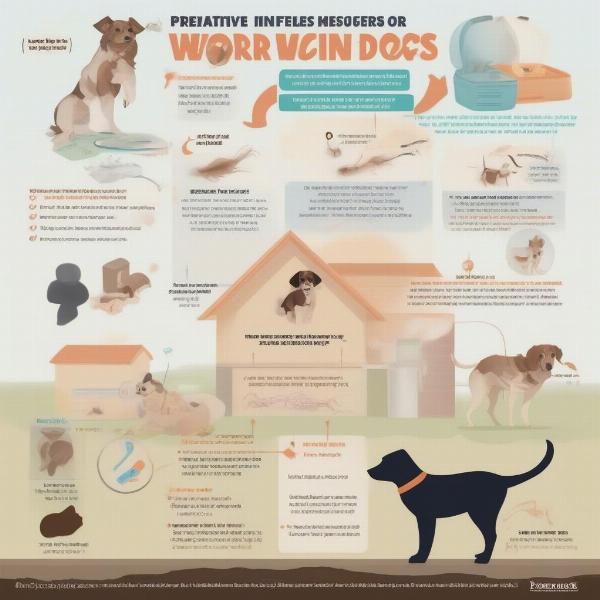Worms in dogs are a common problem, and worm treatment for dogs is a crucial aspect of responsible pet ownership. Whether you’re a seasoned dog owner or just starting out, understanding the different types of worms, the symptoms they cause, and the available treatment options is essential for keeping your furry friend happy and healthy. This guide will cover everything you need to know about worm treatment for dogs, from prevention to diagnosis and treatment.
Understanding the Importance of Worm Treatment for Dogs
Intestinal worms can significantly impact a dog’s health, leading to a range of problems from mild discomfort to serious illness. These parasites thrive in the dog’s digestive system, stealing vital nutrients and causing a variety of symptoms. Regular worm treatment for dogs is not just about protecting your pet, it’s also about protecting your family, as some types of worms can be transmitted to humans.
Common Types of Worms in Dogs
Several types of worms can affect dogs, each with its own set of symptoms and treatment protocols. The most common include roundworms, tapeworms, hookworms, and whipworms. Recognizing the signs of these infestations is the first step towards effective worm treatment for dogs.
- Roundworms: These are long, spaghetti-like worms that can cause vomiting, diarrhea, and a pot-bellied appearance, especially in puppies.
- Tapeworms: These segmented worms are often transmitted through fleas and can cause anal itching and weight loss.
- Hookworms: These small, hook-shaped worms can cause anemia and bloody stools.
- Whipworms: These whip-shaped worms reside in the large intestine and can lead to chronic diarrhea and weight loss.
Symptoms of Worm Infestation in Dogs
While some dogs may show no outward signs of worm infestation, others can exhibit a variety of symptoms. These can include:
- Vomiting
- Diarrhea
- Weight loss
- Pot-bellied appearance
- Dull coat
- Lethargy
- Scooting or dragging their rear end
- Coughing (in the case of lungworm)
If you notice any of these symptoms in your dog, consult your veterinarian immediately.
worming and flea treatment for dogs
Choosing the Right Worm Treatment for Your Dog
Choosing the right worm treatment for dogs can seem overwhelming with so many options available. Your veterinarian can recommend the most suitable treatment based on your dog’s age, breed, lifestyle, and the specific type of worm infestation. Available treatments include oral medications, topical treatments, and injections.
How Often Should You Deworm Your Dog?
The frequency of worm treatment for dogs depends on various factors, including their age, lifestyle, and risk of exposure. Puppies are typically dewormed more frequently due to their higher susceptibility to worms. Adult dogs should generally be dewormed at least every three months, but your veterinarian can advise you on the best schedule for your individual dog.
Preventing Worm Infestations in Dogs
Preventing worm infestations is always better than treating them. Several preventative measures can help minimize your dog’s risk of contracting worms. These include:
- Regular deworming as recommended by your veterinarian
- Flea control
- Proper disposal of dog feces
- Avoiding contact with infected animals
- Preventing your dog from scavenging or eating feces
 Preventing Worm Infestations
Preventing Worm Infestations
worm and flea treatment for dogs
Conclusion
Worm treatment for dogs is a vital part of responsible pet ownership. By understanding the different types of worms, their symptoms, and the available treatment options, you can help protect your dog from these harmful parasites. Regular veterinary check-ups and preventative measures are crucial for maintaining your dog’s health and well-being.
FAQ
-
How do I know if my dog has worms? While some dogs show no symptoms, common signs include vomiting, diarrhea, weight loss, and a pot-bellied appearance. Consult your vet if you suspect your dog has worms.
-
What is the best worm treatment for dogs? Your veterinarian can recommend the most suitable treatment based on your dog’s age, breed, and the specific type of worm infestation.
-
How often should I deworm my dog? Generally, adult dogs should be dewormed every three months, but puppies require more frequent deworming. Consult your veterinarian for the best schedule.
-
Can I get worms from my dog? Yes, some types of worms can be transmitted from dogs to humans. Practicing good hygiene, such as washing your hands after handling your dog, can help prevent transmission.
-
How can I prevent my dog from getting worms? Regular deworming, flea control, proper fecal disposal, and preventing your dog from scavenging can help prevent worm infestations.
-
Are there home remedies for worms in dogs? While some home remedies are suggested, it’s always best to consult your veterinarian for appropriate diagnosis and treatment.
-
What should I do if I think my dog has worms? Contact your veterinarian immediately. They can perform tests to confirm the diagnosis and prescribe the appropriate treatment.
best worm treatment for dogs uk
flea and worm treatment for dogs nz
ILM Dog is your trusted resource for expert dog care advice. We offer comprehensive information on dog breeds, health, training, nutrition, grooming, and much more. From puppy care to senior dog care, we’re here to support you every step of the way. Contact us for personalized advice: Email: [email protected], Phone: +44 20-3965-8624. Visit ILM Dog for more information on dog health and well-being.